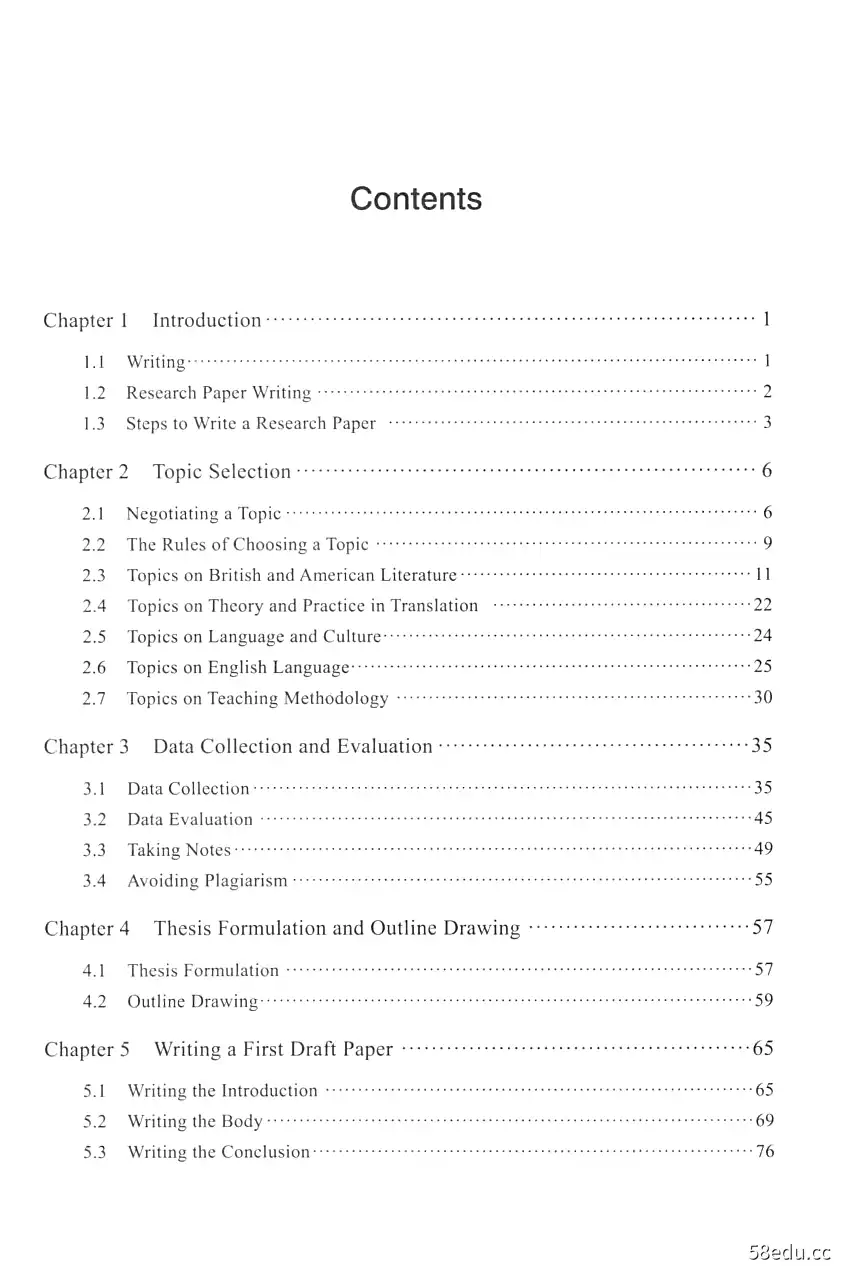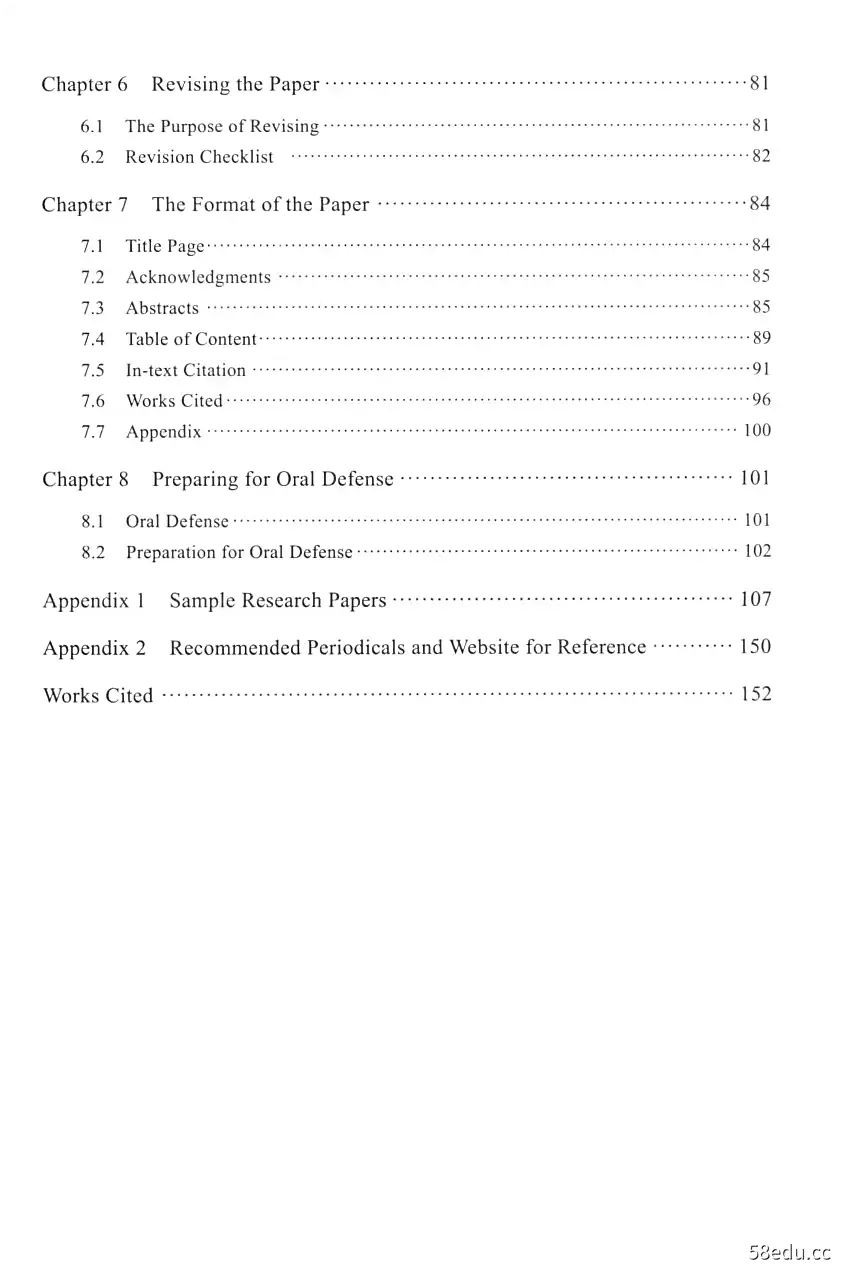《实用英语毕业论文写作》任桂婷,高扩昌|(epub+azw3+mobi+pdf)电子书下载
图书名称:《实用英语毕业论文写作》
- 【作 者】任桂婷,高扩昌
- 【丛书名】普通高等院校“十三五”规划教材
- 【页 数】 153
- 【出版社】 成都:西南交通大学出版社 , 2019.04
- 【ISBN号】978-7-5643-6856-2
- 【价 格】30.00
- 【分 类】英语-毕业论文-写作-高等学校-教材
- 【参考文献】 任桂婷,高扩昌. 实用英语毕业论文写作. 成都:西南交通大学出版社, 2019.04.
图书封面:
图书目录:


《实用英语毕业论文写作》内容提要:
《实用英语毕业论文写作》是一本将知识习得、语言技能训练和思辨能力训练融为一体的学术论文写作教材。内容既包括论文写作规范,又包括研究方法和写作技巧。第一章介绍论文的定义、特征、构成与写作步骤。第二章介绍选题基本原则和方法,以及不同方向的选题技巧。第三章介绍中英文资料的收集、筛选与使用方法。第四章介绍如何提出论题与拟定提纲。第五章讲解如何拟定初稿。第六章讲解英语学术论文的修改与完善。第七章讲解论文摘要、关键词、目录、引文、参考文献、致谢辞等格式规范。第八章讲解论文答辩准备与技巧。本教材以学生思辨能力培养为导向,以实用为宗旨,以论文写作的步骤为主线,既可用于英语专业本科生,也可用于英语教学研究人员以及其他专业初次撰写学术论文者。教材的出版将为初次撰写学术论文者提供实用性以及可操作性的参考和指导,有效解决学习者论文写作中的难题。
《实用英语毕业论文写作》内容试读
Chapter 1 Introduction
1.1 Writing
1.What is writing?
Writing is a medium of communication that represents language through the inscription ofsigns and symbols.In most languages,writing is a complement to speech or spoken language.
Within a language system,writing relies on many of the same structures as speech,such asvocabulary,grammar and semantics.
2.What to write?
Motivations for writing include publication,storytelling,correspondence and diary.Writinghas been instrumental in keeping history,dissemination of knowledge through the media and theformation of legal systems.
3.Types of writing
Writing can be divided into fiction writing and non-fiction writing.Non-fiction can be splitinto two sub-categories:popular writing and professional writing.Popular writing is often read forentertainment,whereas professional writing is read for a specific work-related purpose.Thedifference between the two is not always clear cut.
Professional writing can be divided into two sub-categories:technical writing and academicwriting.Technical writing is always pragmatic (application oriented)while academic writing mayor may not be.
Examples of technical writing are user manuals and instructions,status reports,sales literaturefor technical products,technical memos,in short nearly anything of a technical nature excludingacademic papers.Another view of technical writing is that it deals with an established and acceptedbody of information.It is not breaking new ground (i.e,in general it does not contain newtheoretical information),but consolidating and explaining established non-theoretical informationfor the use of readers without extensive training or learning.Textbooks also are of this type.
As stated above,academic writing describes the original research a researcher has completed
1
or is currently working on.It presents previously unknown information for the first time.It isdetailed enough to allow the reader to assess the author's results and,if necessary,repeat hisresearch.When we assess results we determine if the results are accurate and new.
You will notice that academic writing is split into two sub-categories.Literary writing dealswith literary analysis,while scientific writing,also known as engineering writing or researchwriting,deals with science and technology.As a general rule,an academic paper contains fivedescriptive parts:background (or introduction),method,materials,results,and discussion.Literarywriting and scientific writing differ in the extent to which each uses these parts (which will bedefined and explored more fully later).Literary writing has far greater freedom in the extent towhich the five sections are used.It does not,for example,have the requirement that an experimentmust be repeatable.
Note should also be made of the differences between a thesis paper and a paper for publication.
The following figure 1-1 is a summary which helps to clarify how an academic paper relates toother kinds of non-fiction writing.
writing
fiction
non-fiction
popular
professional
technical
academic
literary
scientific
Figure 1-1 Relationships between kinds of non-fiction writing
1.2 Research Paper Writing
1.What is research paper?
A research paper may be a term paper for a university course,a published article in a journal,and a thesis or a dissertation as a partial requirement for a university degree.It is usually a lengthydocumented report that focuses upon an academic topic and it is intended to inform the audience inthe relevant field about the research topic,purpose,methods,results(findings),conclusions,andrecommendations.
A research paper expresses the author's understanding of the topic based on experiments,facts,
2
data and analysis.It is objective rather than subjective although the author's personal values,insights,and experiences have a great influence on the whole process
A research paper is usually made up of the following parts:1)Title page;
2)Acknowledgements (optional):3)Outline (optional);4)Abstract;
5)The text of the paper (introduction,body,and conclusion);6)Notes (optional);
7)Works cited(reference,bibliography);8)Appendix (optional).
2.Why to write research paper?
Writing research paper is the final comprehensive test of college students'knowledge and ageneral test of students'mastery and improvement of basic knowledge,basic theory and basic skills,which is the main purpose of writing research paper.
For English majors,one of the goals of research paper writing is to cultivate students'Englishreading and writing abilities and their abilities to analyze and solve problems with professionalknowledge,so as to achieve the goal of applying what they have learned.
The second is mainly to check the students'mastery of the professional theoretical knowledgeand basic skills,and take the achievement of the thesis as one of the main bases for students'graduation.
The third is to train students in the skills of collecting and using data,and at the same time totrain students in integrating theory with practice and to enhance their ability to think and solveproblems independently.
1.3 Steps to Write a Research Paper
Like any good job of workmanship,the secret of a good research paper lies in the preparationdone before actually writing the paper.The creation of a research paper can be divided into eightstages as shown in figure 1-2.
Topic selection is the obvious first stage.At this point the research question and hypothesis arein general determined.There is an arrow in the diagram coming into this stage from the right,because the research question and hypothesis may need to be changed as more information (data)become available.
The next stage,explore data,determines if there is enough or too much data available toundertake the project.Also it may be determined that the research question or the hypothesis should
.3
be modified.An arrow both leaves and enters this stage in the diagram to indicate that the topicselected may need to be changed or perhaps more data exploration is necessary and data is gathered instage 3.One of the goals of this stage is to prevent the researcher from duplicating work previouslyaccomplished.Data exploration is usually accomplished using the resources of a good library.
Publish
Review revise
Write paper
Organize data ideas
Formulate thesis
Gather data
Explore data
Select topic
Figure 1-2 Steps to write a research paper
Data is gathered in the third stage.Any tests,experiments,or surveys which need to beperformed to gather data are done here.Again a two-headed arrow indicates that there maybe a needto change the topic or to do further data exploration.
The thesis is formulated in stage 4.The thesis statement is a brief answer (one or twosentences)to the research question.If a hypothesis is used,the thesis statement is a rewording of it.
Depending upon the type of data gathered,how they are to be analyzed,and the ideas to bepresented,the paper will be organized differently.Although not shown in the diagram,it maybenecessary to return to the previous stage to gather more information.
With all the information now before the author,he/she can begin writing the paper in stage 6.
We say "begin writing"because of stage 7,review and revise.The first draft of a paper is veryrarely in good enough condition for publication.The author,if a scientist,will seek comments bycolleagues on the paper.If a student,he may ask another student to read the paper and comment.
Finally the eighth and last stage is publication.In the case of a student,it refers to handing thepaper to an instructor.In the case of a scientist,it refers to actual publication in a journal.If a thesisor dissertation student,it refers to submission to a review committee.
The fact that the researcher can loop among steps one through five,implies that the earlystages at least of developing an academic paper are evolutionary.As more information becomesavailable,a clearer picture of the topic becomes available.The researcher's understanding of thearea of research becomes deeper as his understanding increases.Occasional "blind alleys"will beencountered.These too are valuable since it is as useful to know what is not useful as it is to knowwhat is useful.
There are generally eight steps involved in preparing a paper:
4
1)Topic selection and exploratory reading;2)Thesis proposal;
3)Data gathering and analysis;4)Thesis formulation;
5)Organization of data and ideas;6)Writing the first draft;7)Revising the paper;8)Finalizing the paper.
These steps are somewhat arbitrarily ordered and defined,since they can be combined orperformed in parallel.Nonetheless,all of them are necessary.
Topic selection is necessary even if you are a researcher preparing to publish the results ofyour previous work.You must decide on the scope of your presentation,what to leave out and whatto include.
The preparation of a thesis proposal is obviously necessary if you are a candidate for a degree.
Even a researcher will occasionally need to propose a paper to a conference,for example.
Data gathering and analysis is vital,even to the researcher,who will need to explore andanalyze the existing literature for the previous work by others bearing on his area of interest.
Thesis formulation leads to the creation of a thesis statement,a succinct statement of what thepaper is to accomplish.
The organization of data and ideas is of obvious importance,regardless of the objective of the
paper.
Good writing is evolutionary;the first version of the paper is done for its author's benefit,toget his rough ideas down on paper.
Revisions are done to benefit the reader,to increase the clarity of the paper.
Finally,after the paper body is written,a few finishing touches are necessary to make itattractive to the reader,an editor or a thesis committee.
…5
Chapter 2 Topic Selection
All writing begins with choosing a subject/topic,so is research paper writing.Choice ofsubject,particularly of topic is the first,or perhaps the greatest problem in writing or research.Onefrequently begins with the vague idea of one of the general areas of humanities,social sciences,orscience and technology,such as music,literature,history,or computer,automation,etc.Or one maystart with a fairly general topic in whatever he/she is interested.At this stage the paper writer isnowhere near finalizing a title for the paper.An inappropriate decision about a research topic maylead to the failure of the whole research project,or at least a waste of time and energy.You mayfind it difficult to make a quick decision about the topic.It will have to be refined and finalized,that is to say that the tentatively chosen topic will have to go through a process:from broad tonarrow,from general to specific.
With the subject/topic remaining provisional,one may consult one or more general referenceson the subject/topic.As you move along you may acquire much information or discover many of thethings you didn't know.They may lead to a partial or complete change of direction in your work.
2.1 Negotiating a Topic
Most advisers encourage students to work out their own topics.To negotiate a topic,thestudent must first locate a good research subject,and then resorts to one or a combination of thefollowing exercises:following personal interests,talking with other people,brainstorming andreading source materials.
2.1.1 Following personal interest:negotiating with oneself
Interest is the best teacher.Therefore,the student should focus on what he or she is interestedin and would like to make a further study when deciding on a research topic.If he or she is notinterested in a topic,he or she may perform poorly.
Even if the student has chosen an interesting and promising topic,he or she may not maintaininterest for long.More often than not,many students do not even know what they are interested in.
In this case,they should choose something that seems to promise them real value,something that
6
···试读结束···


